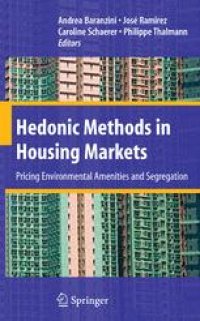
Ebook: Hedonic Methods in Housing Markets: Pricing Environmental Amenities and Segregation
- Tags: Regional/Spatial Science, Environmental Economics, Statistics for Business/Economics/Mathematical Finance/Insurance
- Year: 2008
- Publisher: Springer-Verlag New York
- Edition: 1
- Language: English
- pdf
Cities are growing worldwide and their sprawl is increasingly challenged for its pressure on open spaces and environmental quality. Economic arguments can help to decide about the trade-off between preserving environmental quality and developing housing and business surfaces, provided the benefits of environmental quality are adequately quantified. To this end, this book focuses on the use and advancement of the "hedonic approach", an economic valuation technique that analyses and quantifies the sources of rent and property price differentials. Starting from theoretical foundations, the hedonic approach is applied to the valuation of natural land use preservation and noise abatement measures, as well as to residential segregation and discrimination, extending the analysis to the role of the buyers' and sellers' identity on housing market prices and to the issue of environmental justice.
Cities are growing worldwide and their sprawl is increasingly challenged for its pressure on open spaces and environmental quality. Economic arguments can help to decide about the trade-off between preserving environmental quality and developing housing and business surfaces, provided the benefits of environmental quality are adequately quantified. To this end, this book focuses on the use and advancement of the "hedonic approach", an economic valuation technique that analyses and quantifies the sources of rent and property price differentials. Starting from theoretical foundations, the hedonic approach is applied to the valuation of natural land use preservation and noise abatement measures, as well as to residential segregation and discrimination, extending the analysis to the role of the buyers' and sellers' identity on housing market prices and to the issue of environmental justice.
Cities are growing worldwide and their sprawl is increasingly challenged for its pressure on open spaces and environmental quality. Economic arguments can help to decide about the trade-off between preserving environmental quality and developing housing and business surfaces, provided the benefits of environmental quality are adequately quantified. To this end, this book focuses on the use and advancement of the "hedonic approach", an economic valuation technique that analyses and quantifies the sources of rent and property price differentials. Starting from theoretical foundations, the hedonic approach is applied to the valuation of natural land use preservation and noise abatement measures, as well as to residential segregation and discrimination, extending the analysis to the role of the buyers' and sellers' identity on housing market prices and to the issue of environmental justice.
Content:
Front Matter....Pages I-XXI
Introduction....Pages 1-12
Theoretical Foundations and Empirical Developments in Hedonic Modeling....Pages 15-37
Hedonic Modeling of the Home Selling Process....Pages 39-54
Hedonic Property Value Studies of Transportation Noise: Aircraft and Road Traffic....Pages 57-82
Pricing the Homebuyer’s Countryside View....Pages 83-99
Semi-Parametric Tools for Spatial Hedonic Models: An Introduction to Mixed Geographically Weighted Regression and Geoadditive Models....Pages 101-127
Estimating Hedonic Models of Consumer Demand with an Application to Urban Sprawl....Pages 129-155
Conceptual and Operational Issues in Incorporating Segregation Measurements in Hedonic Price Modeling....Pages 159-175
Using Hedonic Models to Measure Racial Discrimination and Prejudice in the U.S. Housing Market....Pages 177-201
The Problem with Environmental Justice Studies (And How Hedonics Can Help)....Pages 203-224
Distinguishing Racial Preferences in the Housing Market: Theory and Evidence....Pages 225-244
Back Matter....Pages 245-278
Cities are growing worldwide and their sprawl is increasingly challenged for its pressure on open spaces and environmental quality. Economic arguments can help to decide about the trade-off between preserving environmental quality and developing housing and business surfaces, provided the benefits of environmental quality are adequately quantified. To this end, this book focuses on the use and advancement of the "hedonic approach", an economic valuation technique that analyses and quantifies the sources of rent and property price differentials. Starting from theoretical foundations, the hedonic approach is applied to the valuation of natural land use preservation and noise abatement measures, as well as to residential segregation and discrimination, extending the analysis to the role of the buyers' and sellers' identity on housing market prices and to the issue of environmental justice.
Content:
Front Matter....Pages I-XXI
Introduction....Pages 1-12
Theoretical Foundations and Empirical Developments in Hedonic Modeling....Pages 15-37
Hedonic Modeling of the Home Selling Process....Pages 39-54
Hedonic Property Value Studies of Transportation Noise: Aircraft and Road Traffic....Pages 57-82
Pricing the Homebuyer’s Countryside View....Pages 83-99
Semi-Parametric Tools for Spatial Hedonic Models: An Introduction to Mixed Geographically Weighted Regression and Geoadditive Models....Pages 101-127
Estimating Hedonic Models of Consumer Demand with an Application to Urban Sprawl....Pages 129-155
Conceptual and Operational Issues in Incorporating Segregation Measurements in Hedonic Price Modeling....Pages 159-175
Using Hedonic Models to Measure Racial Discrimination and Prejudice in the U.S. Housing Market....Pages 177-201
The Problem with Environmental Justice Studies (And How Hedonics Can Help)....Pages 203-224
Distinguishing Racial Preferences in the Housing Market: Theory and Evidence....Pages 225-244
Back Matter....Pages 245-278
....